











Your













Your



Let’s

The Durban Chamber of Commerce and Industry NPC holds the distinction of being the oldest and largest metropolitan chamber in Africa, having been established in 1856. Our primary objective is to serve the business community in eThekwini by advocating and lobbying for their interests. Our organisation has a member-focused approach, ensuring that their needs are prioritised. We take pride in our brand, which is built on strong values, trust and integrity, making us the preferred choice of chamber for our members.
As the oldest metropolitan chamber in Africa, we are committed to delivering exceptional value to our members through our dynamic collaborations with the private and public sectors. Our efforts go beyond the vast array of value-added services that we provide. We have established a network of 20 Standing Forums that convene frequently to discuss and deliberate on pertinent matters within their respective industries. By doing so, we ensure that our members are well-informed and equipped to navigate the ever-evolving business landscape.
The Durban Chamber also offers membership. We believe in MEMBERSHIP THROUGH FELLOWSHIP and CREATING PARTNERSHIPS. Therefore RELATIONSHIPS are the true currency of commerce. The Durban Chamber facilitates our members’ development of business relationships with one another, as well as with other key stakeholders to promote economic growth.
Tel: +27 31 335 1000
Website: www.durbanchamber.co.za
Chief Executive Officer: Palesa Phili

Email: ceo@durbanchamber.co.za
Marketing and Communications
Email: marketing@durbanchamber.co.za
Business Development
Email: info@durbanchamber.co.za
Palesa has over 20 years’ experience in the information and communication technology (ICT) and telecommunications sector, working for leading multinational companies within the ICT sector. She has 10 years’ experience in executive positions with added experience in board-level positions within the manufacturing and incubation sectors. Her specialties range from strong operational experience to strategic growth and market penetration into various customer environments. She has worked for organisations such as Hewlett Packard, IBM and EMC Computers. Her most recent role was at MTN SA where she was the Regional Head for MTN Business in KZN. Palesa holds a Master’s in Business Administration (MBA) from the University of Johannesburg (UJ) and an advanced Business Management Programme Certificate and is a member of the South African Institute of Directors (IOD). She also sits on various boards, including SmartXchange and Invotech incubators.

Access to the international market
The Durban Chamber of Commerce and Industry NPC assists you in expanding your business globally by connecting you with international chambers around the world. This means that our members have complete access to international chambers of commerce and embassies, thus opening a world of possibilities and business opportunities internationally.
Through our International Business Unit, we produce Certificates of Origin (CO). A CO is a document required for all export processes to prove that the goods are from South Africa, the country of origin. We pride ourselves on being a reputable organisation that is respected in industry. Our CO business is governed by strict compliance guidelines and principles which ensure that every CO produced by the chamber for your product will be 100% vetted and compliant.
Through the Business Development division, the Durban Chamber of Commerce and Industry aims to support and transform small, medium and micro enterprises (SMMEs), including informal businesses in the Durban area, into sustainable businesses ready to do business with large entities. We offer non-financial assistance such as skills development, mentorship, networking workshops and oneon-one consultations.
Durban Chamber has been trusted by CIPC to be the agency that does most of the business legalities in KwaZulu-Natal such as company registrations, CIPC annual returns, name
changing, company amendments, directors’ amendments and company name reservations.
The Durban Chamber has more than 54 000 informal traders who receive assistance with their business needs through the associations they belong into. These businesses have a special membership package which is discounted to accommodate them. Just like SMMEs, they receive nonfinancial support such as skills development, mentorship, networking workshops and one-on-one consultations.
We continue to add value for our members through our robust interactions and partnerships with both the private and public sectors. These initiatives are over and above the numerous value-adding services offered by the chamber and our system of Standing Forums, which meet regularly to consider and debate relevant issues within the sectors that they represent. Our policy a nd advocacy initiatives ensure that we are constantly:
• Identifying government policies relevant to business in Durban and KwaZulu-Natal
• Informing, through research and giving a broader perspective and on such policies
• Liaising with relevant institutional structures to enhance robust collaboration
• Amplifying core issues that impact business with short, medium and long-term perspectives
• Promoting an appreciation of broad-based economic, social and environmental sustainability
• Advocating good practices to our members and enabling policy for the city, province and state
• Assisting in promoting partnership approaches to complex problematic issues affecting business
The Durban Chamber of Commerce and Industry offers a wide variety of services to members, debates current issues through Standing Forums and advocates for business in the appropriate forums.
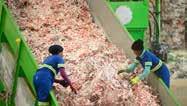
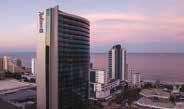

Credits
Publishing director:
Chris Whales
Editor: John Young
Managing director: Clive During
Online editor: Christoff Scholtz
Designer: Tyra Martin
Production: Yonella Ngaba
Ad sales:
Gavin van der Merwe
Sam Oliver
Tahlia Wyngaard
Tennyson Naidoo
Gabriel Venter
Vanessa Wallace
Shiko Diala
Graeme February
Administration & accounts:
Charlene Steynberg
Kathy Wootton
Sharon Angus-Leppan
Distribution and circulation manager: Edward MacDonald
Printing: FA Print
The 2023/24 edition of KwaZulu-Natal Business is the 15th issue of this highly successful publication that, since its launch in 2008, has established itself as the premier business and investment guide for the KwaZulu-Natal Province.
In addition to the regular articles providing insight into each of the key economic sectors of the province, there is a special feature on the growth and importance of the recycling sector, with increasing activity covering cover paper, board, e-waste and rubber.
The overview of the regional economy notes the importance of energy and the steps being taken by KwaZulu-Natal to turn Richards Bay into an energy hub. The fact that the province is also angling to create additional Special Economic Zones suggests that the two existing zones, at Richards Bay and the Dube TradePort at King Shaka International Airport, are living up to expectations in terms of attracting investment and boosting employment. The creation of a joint venture by Transnet and a private operator of ports is a significant step for the Port of Durban.
To complement the extensive local, national and international distribution of the print edition, the full content can also be viewed online at www.globalafricanetwork.com under ebooks. Updated information on KwaZulu-Natal is also available through our monthly e-newsletter, which you can subscribe to online at www.gan.co.za, in addition to our complementary business-to-business titles that cover all nine provinces, our flagship South African Business title and the latest addition to our list of publications, Journal of African Business, which was launched in 2020. ■
Chris Whales Publisher, Global Africa Network Media | Email: chris@gan.co.za
KwaZulu-Natal Business is distributed internationally on outgoing and incoming trade missions, through trade and investment agencies; to foreign offices in South Africa’s main trading partners around the world; at top national and international events; through the offices of foreign representatives in South Africa; as well as nationally and regionally via chambers of commerce, tourism offices, airport lounges, provincial government departments, municipalities and companies.
PUBLISHED BY
Global Africa Network Media (Pty) Ltd
Company Registration No: 2004/004982/07
Directors: Clive During, Chris Whales
Physical address: 28 Main Road, Rondebosch 7700
Postal address: PO Box 292, Newlands 7701
Tel: +27 21 657 6200 | Fax: +27 21 674 6943
Email: info@gan.co.za | Website: www.gan.co.za
Member of the Audit Bureau of Circulations ISSN 1995-1310
COPYRIGHT | KwaZulu-Natal Business is an independent publication published by Global Africa Network Media (Pty) Ltd. Full copyright to the publication vests with Global Africa Network Media (Pty) Ltd. No part of the publication may be reproduced in any form without the written permission of Global Africa Network Media (Pty) Ltd.
PHOTO CREDITS | Aphiwe Moyo, Behind The Lens Photography; Energy Partners Refrigeration; Coca-Cola Beverages South Africa (CCBSA); Dube TradePort; Durban Automotive Cluster; iLembe District Municipality; Mathe Group; Meropa; Momentum; MPact Recycling; Paper Manufacturers Association of South Africa; Renishaw Coastal
Precinct; Radisson Hotel Group; Richards Bay Minerals; Sustainable Recycling Initiative (SRI); The Watt Club; Tongaat Hulett; Transnet National Ports Authority; uMfolozi TVET College; Vuthela Economic Development Support Programme; Wild Coast Sun.
DISCLAIMER | While the publisher, Global Africa Network Media (Pty) Ltd, has used all reasonable efforts to ensure that the information contained in KwaZulu-Natal Business is accurate and up-to-date, the publishers make no representations as to the accuracy, quality, timeliness, or completeness of the information. Global Africa Network will not accept responsibility for any loss or damage suffered as a result of the use of or any reliance placed on such information.
In energy and logistics, policy decisions at national level are having a spinoff for KwaZulu-Natal as Richards Bay continues to build its energy portfolio and a major international ports operator has been brought on board as a partner at the Port of Durban. Additional Special Economic Zones are planned to bolster textile and leather manufacturing.
 By John Young
By John Young
The Provincial Government of KwaZuluNatal has created a KZN Energy War Room. Over and above the interventions into energy efficiency of government buildings and investments in things like solar panels, and plans to continue rolling out electricity connections to previously unserviced households, the administration intends turning Richards Bay into an energy hub.
This ambition received a big boost in 2023 with the decision by the National Energy Regulator of South Africa to approve Eskom’s application to build a 3 000MW gas power station at Richards Bay.
Battery storage has made a debut in the province as well. South Korean firm Hyosung Heavy Industries has signed on to implement the Eskom project to create a battery energy storage system, in this
instance in the uMgungundlovu District Municipality. In the 2023 State of the Province Address, Premier Nomusa Dube-Ncube said that, in addition to the R97-billion Eskom project, the following facilities would be established at the deepsea port:
• Mabasa Energy and Fuels, R10-billion
• NFE BGE Gas Supply, R25-billion
• Phakwe RBGP, R34-billion
An earlier announcement on the energy front by President Cyril Ramaphosa that private investors could generate up to 100MW without having to go through a tangled web of licence procedures was a boon for the province’s larger companies. The likes of Sappi and Mondi produce great quantities of biomass waste and all of the province’s sugar
producers are potentially generators of electricity. Many of them already are producing power for their own use, now they can sell it to the grid.
The signing of a long-term contract for energy supply by Eskom and South32 for its Hillside Aluminium smelter was another very welcome step in the energy field. The deal expires in 2031.
In the oil and gas sector, the big issue of what is going to happen to SAPREF, South Africa’s largest crude oil refinery which suspended operations in 2022, remains unresolved. The provincial government is planning to have a meeting with the refinery’s shareholders and other levels of government to try to find a way of resolving the matter.
The first steps in a move by national government to partner with the private sector in boosting efficiency at ports were taken in 2022: deals were signed at the Port of Durban and at Richards Bay.
In 2023, these first steps became a giant leap when International Container Terminal Services Inc (ICTSI), a Philippines-based port operator, was announced as the preferred partner for a joint venture (JV) to run the Durban Container Terminal with Transnet.
ICTSI operates in 20 countries and employs more than 11 000 people. Transnet will hold 50% plus one share in the JV for 25 years, with an option to extend to 30 years. From the initial list of 17 potential partners, ICTSA was eventually chosen from a shortlist of six. Part of the plan for Durban Container Terminal Pier 2 is to increase traffic in such a way that it will be able to increase its handling capacity from the present 2.9-million TEUs (twomillion 20-foot equivalent units) to 11-million TEUs by 2032.
The 2022 deal involved a 15-year concession for the loading of grain at one of Durban’s agricultural terminals was won by Afgri, one of South Africa’s biggest agricultural firms. Afgri will deal with the operation and maintenance of all landside operations, and the deal includes a similar arrangement at East London. The other two terminals in Durban are operated by SA Bulk Terminals and Bidvest Bulk Terminals.
The provincial government is working on an investment pipeline, through the Special Economic Zones (SEZs), of R22-billion. The SEZs at Richards Bay and King Shaka International Airport (the Dube TradePort) are key components of the strategy and are now well-established nodes of investment.
Milestones have been reached in the plan for creating further SEZs to focus on leather and textiles. A business case has been completed by units within the provincial government and land at Ezakheni (Ladysmith) in the uThukela District has been identified and secured. Dube TradePort will be the SEZ operator and R780-million in investments has been pledged by companies keen to relocate to the SEZ. To spread the benefits of the SEZ, the concept of “The Textile Belt” will be followed. The corridor approach will leverage comparative advantages of various regions in the clothing and textile value chain. This belt will start from Newcastle and link Ladysmith, Mooi River, Pietermaritzburg, Hammarsdale, Durban, Isithebe and the Dube TradePort to the Richards Bay Industrial Development Zone.
Infrastructure upgrades at Madadeni, Isithebe and Ezakheni have been completed, which went some way to creating jobs and which will create a more conducive environment for investors.
Tourism is a key sector in the KwaZulu-Natal economy and provides livelihoods to many thousands of families in urban and rural areas. The closing of borders brought real hardship to many areas.
A number of flights have been resumed to King Shaka International Airport by the likes of Turkish Airlines and a new flight has been inaugurated by SA Airlink, connecting the province to Zimbabwe.
The province’s existing infrastructure, good soils and fine weather provide a solid base for a varied economy. KwaZulu-Natal has significant capacity in heavy and light manufacturing, agro-processing and mineral beneficiation, all of which is supported by South Africa’s two busiest ports (Richards Bay and Durban), the country’s most active highway (the N3),
The first fruits of the harvest are celebrated every year at the Umthayi Marula Festival in northern KwaZuluNatal. Residents of Swaziland and Mozambique are frequent visitors.
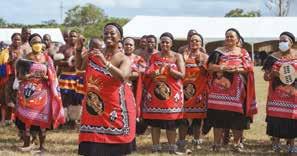
a modern international airport and pipelines that carry liquids of all types to and from the economic powerhouse of the country around Johannesburg in the interior.
Sappi’s dissolving pulp mill at Umkomaas south of Durban is one of the province’s most significant industrial sites as it produces huge quantities of a material that is used in viscose staple fibre, which in turn is used in clothing and textiles. Mondi is the province’s other global giant in forestry, paper and packaging. Toyota and Bell Equipment are dominant players in the automotive sector.
Many banana farmers on the KwaZulu-Natal South Coast have started planting macadamias. In one case, half of a big farm has been converted to cultivating the popular nut. “Along the KZN South Coast, we enjoy a subtropical climate that creates a fertile environment that supports a variety of crops in the agricultural sector,” explains Phelisa Mangcu, CEO of South Coast Tourism and Investment Enterprise (SCTIE).
KwaZulu-Natal has 10 district municipalities and a metropolitan municipality, the most of any province in South Africa. In economic terms, the province offers diverse opportunities.
This area is the province’s most populous. The city of Durban has experienced booms in sectors such as automotive, ICT, film and call centres. The promenade now reaches all the way to the harbour and the Point development will benefit.
Major investments are taking place at the Port of Durban. The Container Terminal will be expanded on the back of an investment by an international
port operator. Durban’s conference facilities are well utilised, but many opportunities still exist in chemicals and industrial chemicals, food and beverages, infrastructure development and tourism. Further south, Margate’s airport and Port Shepstone’s beachfront are assets.
Also known as the Midlands, this is a fertile agricultural region which hosts the popular annual Royal Show. It produces sugar cane, fruit, animal products, forestry and dairy products.
Pietermaritzburg is the provincial capital and home to a major aluminium producer along with several manufacturing concerns, including textiles, furniture, leather goods and food. The city has good transport links along the N3 national highway, excellent schools and a lively arts scene. The Midlands Meander is a popular tourist destination.
Eastern region
Although most of this area is rural, Richards Bay is one of the country’s industrial hotspots because of its coal terminal, port and aluminium smelters.
The Richards Bay Industrial Development Zone is a major economic node and mining is an important sector. The other major urban centre is Empangeni which has several educational institutions. The King Shaka International Airport is adjacent to the Dube TradePort.
The economic powerhouse is Newcastle in the north-west: coal mining, steel processing and manufacturing are major activities. Some old coal mines are being reopened by new coal companies to cater for the country’s power stations’ demand for the fuel. Game farms, trout fishing and hiking are part of an attractive package for tourists, and Zululand is a popular destination for cultural experiences. The region is rich in Anglo-Boer War history which includes battle sites such as Islandlwana and Rorke’s Drift. ■

Growing middle class, affluent consumer base, excellent returns on investment.
SA is the location of choice of multinationals in Africa. Global corporates reap the benefits of doing business in SA, which has a supportive and growing ecosystem as a hub for innovation, technology and fintech.
The African Continental Free Trade Area will boost intra-African trade and create a market of over one billion people and a combined gross domestic product (GDP) of USD2.2-trillion that will unlock industrial development. SA has several trade agreements in place as an export platform into global markets.
South Africa (SA) has the most industrialised economy in Africa. It is the region’s principal manufacturing hub and a leading services destination.
SA has a sophisticated banking sector with a major footprint in Africa. It is the continent’s financial hub, with the JSE being Africa’s largest stock exchange by market capitalisation.
07.
SA has a number of world-class universities and colleges producing a skilled, talented and capable workforce. It boasts a diversified skills set, emerging talent, a large pool of prospective workers and government support for training and skills development.
03. 09.
SA has a progressive Constitution and an independent judiciary. The country has a mature and accessible legal system, providing certainty and respect for the rule of law. It is ranked number one in Africa for the protection of investments and minority investors.
SA is endowed with an abundance of natural resources. It is the leading producer of platinum-group metals (PGMs) globally. Numerous listed mining companies operate in SA, which also has world-renowned underground mining expertise.
A massive governmental investment programme in infrastructure development has been under way for several years. SA has the largest air, ports and logistics networks in Africa, and is ranked number one in Africa in the World Bank’s Logistics Performance Index.
10.
SA offers a favourable cost of living, with a diversified cultural, cuisine and sports offering all year round and a world-renowned hospitality sector.

“By extending its applications, we can harness the power of computational modelling to tackle poverty, unemployment and national security and promote environmental, social and governance (ESG) practices.” –
Dr Regina Maphanga
ESG practices. As a thought leader in computational modelling, I firmly believe that leveraging its capabilities in these domains can reshape our society and create a more equitable and secure future.
Poverty alleviation and unemployment are pressing socioeconomic challenges that require comprehensive approaches to address them effectively. Computational modelling offers a powerful tool for understanding the intricate dynamics of these issues and developing targeted strategies for intervention.
Computer modelling refers to the process of creating virtual representations or simulations of real-world systems, allowing researchers and policymakers to study and analyse complex phenomena in a controlled environment or processes using computer software and algorithms. It entails the use of mathematical equations, data inputs and computational algorithms to mimic and simulate the behaviour, interactions and outcomes of the system being modelled.
Computer modelling offers several benefits and applications. It allows researchers, scientists, engineers and decision-makers to study complex systems, explore what-if scenarios, optimise designs, predict outcomes and make informed decisions without the need for costly or time-consuming physical experimentation. It bridges the gap between theoretical understanding and real-world complexity, enabling us to gain insights into systems that may be inaccessible, expensive or dangerous to study physically.
By extending its applications, we can harness the power of computational modelling to tackle poverty, unemployment and national security and promote
By applying computational models, researchers can simulate various scenarios to assess the impact of different policies and interventions on poverty reduction and employment creation. These models consider factors such as economic indicators, social conditions, educational attainment levels, access to resources and government initiatives, to cite a few.
Furthermore, computational modelling enables policymakers to identify potential bottlenecks or unintended consequences that may arise from certain interventions. By analysing various parameters within the model’s framework, decision-makers can optimise resource allocation by prioritising sectors with a high potential for job creation, while also targeting vulnerable populations that are most in need of support.
This understanding enables us to design targeted interventions such as skill-development programmes, job-creation initiatives and social-safety nets, with the aim of fostering inclusive economic growth and enhancing livelihoods.
Ensuring the safety and security of nations in an increasingly digital and interconnected world demands
advanced tools for risk assessment, intelligence analysis and strategic planning. Computational modelling plays a pivotal role in analysing complex geopolitical landscapes, simulating potential scenarios and assessing the impacts of various policies. By integrating diverse datasets and employing sophisticated algorithms we can enhance our ability to detect emerging threats, formulate effective defence strategies and safeguard national interests.
The integration of ESG principles is vital for organisations that are committed to long-term sustainability and responsible business practices. Computational modelling empowers decision-makers to evaluate the impact of their actions on environmental conservation, social wellbeing and corporate governance. By incorporating diverse variables and quantifying the potential outcomes, organisations can identify sustainable investment opportunities, optimise resource allocation and enhance transparency and accountability.
Next-generation manufacturing industries can push the boundaries of innovation by adopting modelling tools. Computational modelling supports innovation in product and process design, reduces the need for physical testing and prototypes, defines complex process parameters and leads to quality products and robust manufacturing processes.

The efficient utilisation of resources, resilience to climate change and the development of smart cities are critical
components of a sustainable future. Computational modelling enables us to design and optimise infrastructure systems, integrating renewable energy sources, transportation networks and waste management systems. By simulating the interactions between these components, we can identify strategies that minimise environmental impact, enhance energy efficiency and improve the quality of life for urban populations.
Management in the face of natural disasters, disease outbreaks or humanitarian crises, computational modelling offers crucial support for emergency response and resource allocation. By simulating different scenarios emergency planners can identify optimal strategies, assess the potential impacts and allocate resources effectively. Furthermore, modelling the spread of infectious diseases aids in understanding transmission dynamics, evaluating the effectiveness of interventions and formulating proactive healthcare strategies.
As computational modelling revolutionises our understanding of complex systems, it becomes a powerful tool for driving social impact. By leveraging its capabilities in poverty alleviation, unemployment mitigation, national security and ESG practices, we can foster a more inclusive, secure and sustainable future.
I am committed to pushing the boundaries of its application in various domains, working towards a world in which technology is harnessed for the betterment of society. Let us embrace computational modelling as a catalyst for transformative change, shaping a future that leaves no-one behind and prioritises the wellbeing of both people and the planet. ■
This thought leadership article was written by Dr Regina Maphanga. Dr Maphanga is the Research Group Leader for the Design and Optimisation research group at the Council for Scientific and Industrial Research (CSIR) in Pretoria. She has a PhD in physics from the University of Limpopo.
Email: RMaphangai@csir.co.za
Now is the time to seize the tremendous opportunities offered by computational modelling. By partnering with the CSIR, a thought leader in computational modelling and sustainable business development, you can unlock new frontiers and drive innovation at a reduced cost and time. Our expertise will empower your organisation to harness the full potential of computational modelling, optimise operations, embrace sustainable practices and position your brand as a leader in the market.
Recycling is good for the environment and creates business opportunities.
Recyling is no longer a niche activity for ecowarriers. It’s become a part of the mainstream economy. Sustainability is becoming a watchword for many businesses, so it makes sense to recycle and to reuse.
Mpact Recycling has expanded its operations in KwaZulu-Natal with the opening of a new R150million facility at Bridge City, pictured. With a larger warehouse than the company had at its previous location, a large sorting plant and two baling machines are now accommodated under one roof and there are separate administration and operations centres. Improved design allows for more efficient offloading and loading of material and a 130kW solar installation creates efficiencies with regard to energy. Mpact is considering expanding the solar installation and connecting to the local grid as a supplier or wheeling to its other facilities in the province. Mpact Recycling has three sorting and baling plants in KwaZuluNatal and 15 branches altogether in South Africa.
Mpact Recycling is a division of the Mpact Group and processes more than 600 000 tons of waste every year. The company reports than by recycling

one ton of paper, 26 498 litres of water is saved.
The Sappi Group has a company called Sappi ReFibre which expressly aims to support the small, medium and micro-enterprise (SMME) market. By offering a secure market for certain types of recyclable board and paper, the firm gives agents the security of knowing that they can sell what they collect. Through Sappi’s Enterprise and Supplier Development Programme, Sappi ReFibre has provided equipment and business support to the value of about R10-million over the years.
A new Waste Management Licence has been issued to the Mathe Group for a new tyre-recycling facility to be built alongside its existing operation. The exact amount of the investment will be determined by the technology deployed but it is estimated to be in the region of R65-million.
Truck-tyre recycling company Mathe Group is part of the PFE International Group which also contains recycled-rubber-flooring company Van Dyck and is based in Hammarsdale, between Cato Ridge and Pinetown.
(Tyre Recycling Industry Association of South Africa). He notes that although the volume of waste tyres continues to grow in South Africa, the country persists in importing virgin rubber.

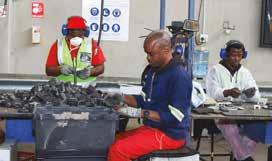
Because tyres are largely composed of rubber, when they are discarded, the potentially valuable rubber goes to waste. Zarrebini says, “By recycling tyres, this rubber can be salvaged and reused. This process is known as crumbing or grinding and involves breaking down the used tyres into small granules of powder. These can then be used in various applications as a replacement for new rubber. These applications range from the production of new tyres to road construction, playground surfaces and the manufacturing of rubber goods, among many others.” In addition to planning for the building of a new facility, Mathe Group is expanding the capacity of its existing plant. Output will increase from between 25 and 30 tons of rubber crumb to 45 tons and increase the number of tyres recycled from 700 radial truck tyres per day to approximately 1 000 per day.
Van Dyck, originally a carpeting manufacturer, pivoted away from soft flooring to rubber-based products during the Covid period but the factory was then hit by the terrible floods of 2022.
The Van Dyck operations are now also located in Hammarsdale and are also expanding. The company produces rubber goods by moulding recycled rubber crumb.
Recycled rubber flooring in a gym installation not only provides for a more comfortable performance but also enhances acoustic performance and eliminates noise pollution.Coming off a low base, Van Dyck has in 2023 registered a
200% increase in the manufacture of moulded products. Notes Zarrebini, “Our production facility is now operating 24/7 at full capacity despite the interruptions of loadshedding. The new equipment that will arrive will enable our operations to double capacity of certain moulded products.”
Most of the growth in moulded products has come from South Africa and the UK to which Van Dyck exports gym flooring, acoustic shock pads and acoustic cradles. Projects in Rwanda, Uganda and Kenya have been completed with the acoustic underlays, which are often utilised under carpeting in the hospitality sector. A popular product recently introduced by Van Dyck is a magnetically receptive rubber underlay known as Ezy Install.
With the proliferation of gadgets in the world, the waste electrical and electronic equipment (WEEE) recycling industry has become an increasingly important part of the sustainability equation.
Despite WEEE being the fastest-growing waste stream in most countries, South Africa’s current recycling rate is between 2% and 2.5% for waste lighting and between 10% and 12% for other electrical and electronic equipment. As of 2021, it is illegal to send e-waste to landfill but few people know this.
RecycleX, located in Ballito and with more than 100 staff members, is one of the biggest e-waste recycling facilities in the country.
Falling under the Vuthela iLembe LED Support Programme, the Sustainable Recycling Initiative (SRI) research has highlighted that little has been done to comply with the WEEE ban. As a result, a new partnership has been created in the iLembe District Municipality, encompassing provincial and local government, local business and residents’ associations, WEEE recyclers, NGOs, representatives of waste pickers, Producer Responsibility Organisations and the SRI team. It is called “WEEE are iLembe”. ■

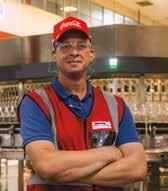
Gavin Lundell, CCBSA’s Senior Project Manager, explains how the project at the Premier plant in KwaZulu-Natal is enabling the production of 2L returnable plastic packs, underlining the company’s commitment to reduce environmental waste. The 2L returnable, also known as refillable PET bottle (RefPET), was launched in 2020 in the Eastern Cape and has since been expanded to other provinces – offering consumers value for money while including them as an important part of the recycling value chain. CCBSA is now excited to launch this pack in KZN.
Please describe the scope of the project.
We began our project in 2022 by removing two glass pack production lines (Line 2 and Line 4) to accommodate the installation of Line 9, an innovative production line with the capability to produce 2L RefPET packs at 25 000 bottles per hour as well as 1.25L returnable glass bottles with paper labels (RGBPL) at 33 000 bottles per hour. We began production of RGBPL packs on 5 April and production of RefPET packs on 10 May 2023. The warehousing and distribution areas are also undergoing an extensive upgrade to accommodate the new pack.
Explain the process of producing RefPET.
Once a bottle is returned to CCBSA, it goes on a looped journey to be cleaned in accordance with Coca-Cola’s stringent measures and requirements, then refilled to start its next lifecycle. When the bottle reaches the end of its useable lifecycle, it joins the recycling value chain and is repurposed into another PET product.
Gavin Lundell is a Senior Project Manager for CCBSA’s four manufacturing plants in the Coastal Region. Gavin’s previous roles in the bottling system included being a Unit Manager, Packaging Engineer and Project Engineer. Gavin is a qualified Mechanical Engineer and one of his professional accomplishments was leading the installation of Line 3 at CCBSA’s Phoenix plant in Durban, which was hailed as one of the best projects executed in the business.
All the drains on L9 were installed with high-flow gullies, which ensure that water from the various processes drains away quickly. This means that there is no pooling of water on the floors. While there are other combined returnable plastic and glass pack lines in CCBSA, we used different equipment manufacturers for Line 9 equipment. KHS supplied us with a new type of filler, beverage blender and labeller, as well as packing machines and most of the inspection equipment, while Unisensor supplied us with the sniffer. As time goes by, we are keen to see how this equipment compares to the equipment installed on the other bottling lines within CCBSA.
Tell us more about the sniffer.
RefPET bottles are porous, which means if exposed to foreign substances and chemicals, they may be absorbed by the bottles, making cleaning a challenge. To ensure that there is no risk of refilling RefPET bottles that have been exposed
to chemicals, we have a sophisticated electronic machine known as the sniffer that samples the vapours in each bottle. If it detects chemical substances, it rejects the RefPET bottle which is then destroyed.
What was your experience of the project?
While it was exciting, the project, like any other, came with its challenges such as the late arrival of equipment. The equipment was ordered in 2021 but owing to the continued impact of Covid-19, we only began receiving equipment from late 2022 which delayed the installation.
Another challenge was ensuring a continued supply of 1.25L RGBs. Line 4 was the only 1.25L RGB line in KZN, so we had to minimise the production downtime for its removal. We therefore phased preparation for Line 9 by removing Line 2 in 2022 and completing all the intensive construction work in the open area while Line 4 ran through our December peak. In early 2023, we shut down and removed Line 4 to prepare the floor, while we started installing Line 9 in the old Line 2 area.
The design and planning of the line and the sequence of installation was a huge collaborative effort between our team and all the suppliers involved. Condensing a three-to-four-month construction and build phase into a 10-week shutdown was a major achievement!
How much training was required to get production staff up to speed to operate the new line?
We arranged training internally as well as through the Original Equipment Manufacturer (OEM) to upskill employees and expand their capabilities. This included both theory and practical training on the new equipment. It is through our incredible and passionate people that we have been able to successfully commission this line.
What are the advantages of the new pack in terms of sustainability?
CCBSA, a subsidiary of Coca-Cola Beverages Africa (CCBA), and a bottler for The Coca-Cola Company, has committed to help collect a bottle or can for every single one it produces by 2030, use 50%


recycled content in all packaging and make 25% of its packaging reusable by the same year, while making all its packaging 100% recyclable by 2025. This is part of our World Without Waste Vision 2030, which relies on partnerships with customers, consumers, communities, industry and governments to succeed. This returnable 2L plastic pack helps us contribute to achieving that vision.
Aside from helping to reduce waste, what are the other advantages?
The 2L RefPET selling price to consumers is 33% lower than one-way plastic packs, making it more affordable for consumers and increasing sales for both our customers and our business.
What do consumers need to know?
The returnable PET bottles are expected to be available in KZN stores from June 2023. The plastic packs are identifiable by a new paper label, with ‘RETURNABLE’ appearing in green on the front of the bottle. Similar to returnable glass bottles, consumers will need to pay a deposit which they will get back upon their next purchase, encouraging returns. ■


Agroup of young black female farmers are in the process of completing a three-year incubator programme which will equip them with the skills to compete in the marketplace and expand their businesses.
The Momentum Metropolitan’s Women in Farming programme offers training in mental wellness and analysis, poultry and vegetable farming, soil fertility and plant nutrition. At the end of the programme, graduates are invited to become part of the Pietermaritzburg Agri network, qualifying as contracted traders while receiving exposure to new market access opportunities.
The province’s two agricultural colleges, Cedara and Owen Sitole, are to become the sites of digital transformation and new technologies. The KwaZulu-Natal Department of Agriculture and Rural Development (DARD) is investing in 4IR to improve agricultural production and intends turning research stations into centres of excellence. Cedara is in the Midlands and the Owen Sitole College of Agriculture is near Empangeni.
In the 2023/24 financial year, 340 agricultural graduates will be enrolled by DARD on farms where they will learn practical skills. Coaching and mentorship underpin this programme, now in its third year.
Another DARD initiative is to promote food security through the planting of seedlings. The target in 2023/24 is 10-million seedlings on 6 293ha, a project that will create 115 jobs for young people.
Tongaat Hulett going into business rescue in 2020 was a major shock, not only to the many businesses which rely on the sugar producer in KwaZulu-Natal, but because the company has a long history and has become one of the biggest corporate names in the South African economy.
In 2022 seven former Tongaat Hulett senior executives appeared in court on charges of fraud for allegedly backdating sales agreements of the company’s property division to score better bonuses.
As a result of finding massive holes in the balance sheet, many assets had to be sold, including Tambankulu Estates in Eswatini for R375-million.
The business rescue practitioners (BRP), Metis Strategic Advisors, managed to keep 2 500 employed at the company and invested more than R400-million in off-crop capital maintenance between December 2022 and April 2023.
At the end of May 2023, the BRP produced a statement which read, in part: “When the business entered business rescue in October 2022, the operations were brought to a standstill as there was no free cash available to fund operations or to settle creditors or employees.
“A constant factor in our minds in the execution of this business rescue is the enormous social impact of the businesses under our care. It is beyond question that the successful rescue of especially THL’s sugar operations in South Africa will save tens of thousands, possibly hundreds of thousands, of direct and indirect jobs. We take this responsibility very seriously and are confident that Tongaat Hulett has a future.”
In July 2023, Metis announced that a Tanzanian company, Kagera Sugar, was the preferred buyer of Tongaat, a decision that will be referred to shareholders later in the year.
The sugar industry itself faces many challenges, not least the imposition of a sugar tax and imports from countries such as Brazil, India and Thailand. Diversification is vital for the future and power
generation will be an important part of that. Neither of the Big Two companies relies exclusively on South African sugar earnings: the troubled Tongaat Hulett has a big property portfolio and Illovo draws most of its profit from operations elsewhere in Africa.
A start has been made on tackling the many challenges faced by the sugar industry: the Sugarcane Value Chain Master Plan 2030 has been signed by two national government ministers and various sector participants. An important part of the transformation of the sugar industry involves supporting small-scale farmers. Of the 10 443 farmers who supply Tongaat Hulett, 94% are small-scale farmers. The Illovo Small-Scale Grower Cane Development Project used 119 local contractors to develop the fields of 1 630 new growers on 3 000ha.
SA Canegrowers represents 23 866 growers and is responsible for the production of 18.9-million cane tons. The Sugar Terminal at Maydon Wharf, Durban, serves 11 mills and can store more than halfa-million tons of sugar. It also has a molasses mixing plant.
Of KwaZulu-Natal’s 6.5-million hectares of agricultural land, 18% is arable and the balance is suitable for the rearing of livestock. The
KwaZulu-Natal Agricultural Union: www.kwanalu.co.za

Milk Producers Organisation: www.mpo.co.za
South African Cane Growers’ Association: www.sacanegrowers.co.za
South African Sugar Association: www.sasa.org.za
province’s forests occur mostly in the southern and northern edges of the province.
The coastal areas lend themselves to sugar production and fruit, with subtropical fruits doing particularly well in the north. KwaZulu-Natal produces 7% of South Africa’s citrus fruit. The Coastal Farmers Co-operative represents 1 400 farmers.
TWK is a R6-billion operation that originated in forestry but which is now a diverse agricultural company with seven operating divisions. It has 19 trade outlets in the province and 21 in Swaziland and Mpumalanga.
Beef originates mainly in the Highveld and Midlands areas, with dairy production being undertaken in the Midlands and south. The province produces 18% of South Africa’s milk.
KwaZulu-Natal’s subsistence farmers hold 1.5-million cattle, which represents 55% of the provincial beef herd, and their goat herds account for 74% of the province’s stock. The Midlands is also home to some of the country’s finest racehorse stud farms. The area around Camperdown is one of the country’s most important areas for pig farming. Vegetables grow well in most areas, and some maize is grown in the northwest. Nuts such as pecan and macadamia thrive.
Enterprise iLembe, the development arm of the iLembe District Municipality, is looking for investors to further develop an agro-processing hub near the King Shaka International Airport and Dube TradePort. ■
The sector is proud of its green credentials.
Several myths were debunked when leaders of the forestry and paper sectors gathered in July 2023 for a roundtable discussion hosted by the Paper Manufacturers Association of South Africa (PAMSA).

The first relates to misconceptions about plantations. “Deforestation happens when you cut trees down and do not replant them,” explained Jane Molony, executive director at PAMSA. “We do not use indigenous or natural forests in this country. We farm trees in just the same way you would farm grain or maize.”
Noting that wood products can be good for the environment, Dr Tracy Wessels, Group Head of Sustainability and Investor Relations at Sappi noted, “By harvesting a small proportion of mature trees and replanting with new trees each year, we improve the carbon sequestration rate.”
Timber plantations or planted forests represent just 7% of the planet’s forest area but provide about 50% of the wood for global industrial use such as pulp, paper and timber for construction. In South Africa, about 30% of the forestry-owned land is set aside for biodiversity. The roundtable also discussed the latest trends in packaging and working towards a circular economy through better management of waste.
Sappi has 19 production facilities on three continents (of which five are in Southern Africa) and 12 800 employees in over 35 countries. Sappi’s Stanger Mill is situated close to sugar cane fields from which it takes bagasse (dry sugar cane pulp) for use in its production processes. Typek office paper is made at this mill, which has the capacity to produce 80 000 tons of paper and 30 000 tons of tissue.
At the company’s Tugela Mill up to 200 000 tons per annum of containerboard (corrugating medium) can be manufactured from recycled and virgin fibre. The giant Sappi Saiccor mill 50km south of Durban is the world’s biggest manufacturer of dissolving wood pulp.
The Mondi Group has grown into an international behemoth with 26 000 employees and operations in more than 30 countries. Mondi’s Merebank Mill produces a range of office paper products
Forestry South Africa: www.forestry.co.za
National Department of Forestry, Fisheries and the Environment: www.dffe.gov.za
Paper Manufacturers Association of South Africa (PAMSA): www.thepaperstory.co.za
South African Institute of Forestry: www.saif.org.za
30% of forestry-owned land in South Africa is set aside for biodiversity.
including the well-known brand, Mondi Rotatrim. Uncoated woodfree reels are manufactured for the South African and SubSaharan African markets.
Nampak produces crêpe paper at Verulam and Rafalo produces tissue paper. SA Paper Mills is another paper producer.
Mpact has plastics and paper operations, with the paper section divided into three divisions: paper manufacturing, corrugated and converted paper products and recycling.
The National Department of Forestry, Fisheries and the Environment has set a target for South Africa to plant 10-million trees, two-million per year for five years. ■
Using harvested wood products offers unique potential for a greener world, as Jane Molony, executive director, Paper Manufacturers Association of South Africa explains.

Our biggest allies in building a greener, low-carbon world are trees, and trees of all kinds. Trees and countless plant species take up carbon dioxide for energy and growth. In turn, they give us oxygen. Photosynthesis is quite remarkable.
A tree-poor country by global standards, South Africa has 500 000 hectares of closed-canopy indigenous forests. It is for this very reason that indigenous trees are never used for commercial production and why we have 1.2-million hectares of planted forests or timber plantations.
The latter supports our wood value chain, supplying wood for use in pulp, cellulose, paper, packaging, sawn timber and poles among other things. Akin to farming, forestry involves the sustainable and scientifically backed cultivation of specific tree species for such purposes.

For the pulp and paper industry, we have 850-million trees growing on more than 676 000 hectares. Less than 10% of this total area is harvested during any year and the same area is replanted with new trees – specially cultivated saplings.
These plantations share land with indigenous landscapes – grasslands, woodlands and wetlands – which are actively conserved on forestry-owned land, complementing biodiversity and waterstewardship efforts. Opponents of the forestry sector do not see the bigger picture. Many fail to recognise
the difference between sustainable forestry, as described above, and deforestation.
The Food and Agricultural Organisation of the United Nations defines deforestation as “the conversion of forest to other land use independently of whether human-induced or not”, adding that deforestation is essentially referring to a change in land use, not in tree cover. Deforestation includes areas of forest converted to agriculture, pasture, water reservoirs and urban areas.
Sustainable forestry ensures that not only do we improve carbon sequestration by planting young trees, but also keep carbon stored in harvested wood products. And it’s not just conventional wood and paper that have this potential.
Cellulose has found application in textiles, sponges, paint, cosmetics, pharmaceuticals, detergents and even laptop screens. And of course, by recycling paper, carbon in the paper fibres is kept locked up for longer. Recycling is not about “saving trees”.
By using more sustainably farmed harvested-wood products, we can take up more carbon, store more carbon and find low-carbon solutions for everyday needs. ■
High courts rule on coal expansion project.
Aproject to extend the life-of-mine of an anthracite coal mine in a rural community north of Richards Bay will go ahead after several visits to high courts.
Mining at Somkhele was halted in 2022 on the basis of a North Gauteng High Court ruling relating to various permissions not having been obtained by Tendele Coal Mining (a Petmin subsidiary) but in July 2023 a judge of the KwaZulu-Natal High Court, Pietermaritzburg, ruled that mining could continue.
The case was brought by the Mfolozi Community Environmental Justice Organisation and other NGOs, including the Global Environmental Trust. A trust holds 20% ownership of Somkhele, of which 80% belongs to a community trust and the balance to an employees’ trust.
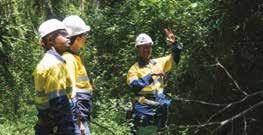
Richards Bay Minerals (RBM), a subsidiary of the Rio Tinto Group, resumed operations at its mineral sands plant and refinery in 2021 but has not yet committed to continuing to invest in a major mine-life extension. The main products of the RBM mine are zircon, rutile, titania slag, titanium dioxide feedstock and high-purity iron.
RBM’s dune and environmental projects, pictured, have so far rehabilitated more than 3 311ha. More than 35 scientific studies have been conducted by scientists from around the world who have studied the company’s methods.
Since 2018, titanium dioxide producer Tronox Holdings has contributed R22-million per year to local communities, including through local procurement opportunities. Tronox exports titanium ore, zircon and other materials to its pigment plants around the world where titanium dioxide pigment is produced for use in paints, plastics and paper. About 21% of the company’s workforce is made up of women. The KZN Sands mineral sands operation comprises a central processing complex in Empangeni and the Fairbreeze Mine.
Most of the product from the smelter (high-quality primary aluminium ingot) is exported but some liquid metal form is sent to Isizinda Aluminium which supplies Hulamin, a company that has had a rolling mill in Pietermaritzburg since 1949. Hulamin is the only major
Council for Geoscience: www.geoscience.org.za
Geological Sciences, University of KZN: www.geology.ukzn.ac.za
National Department of Mineral Resources: www.dmr.gov.za
aluminium rolling operator in the region and it makes rolled products and extrusions.
The Covid pandemic in 2020 added to the ongoing problem of reliable electricity supply, which is a critical issue for a big energy user like a smelter. After extended negotiations, South32 and Eskom have signed a longterm energy supply agreement for the Hillside Aluminium smelter to 2031.
Other processing facilities in the province include the steel plant owned by Arcelor Mittal in Newcastle and Safa Steel’s metal-coating factory in Cato Manor. Some of the coalfields of the province have been revived.
Luxembourg-based Traxys Africa, which has chrome mines in Mpumalanga and Limpopo provinces, runs a high-carbon ferrochrome plant at Richards Bay. ■
More than 60% of Hulamin’s sales come from exports.PHOTO: Richards Bay Minerals
Richards Bay will host a gas power plant.
Eni has agreed to explore offshore.
The National Energy Regulator of South Africa (Nersa) has approved an application from national utility Eskom to build a 3 000MW gas power station in Richards Bay.
An allocation of 3 126MW to natural gas has been made in the national medium-term energy policy to 2030. The National Department of Mineral Resources and Energy allocated one of the first two gas-to-power plants to be constructed under the Independent Power Producer Procurement Programme (IPPPP) to Richards Bay, pictured. This has the potential to turn the Richards Bay Industrial Development Zone (RBIDZ) into an energy hub.
Environmental groups have lodged appeals in an attempt to stop the building of the plant, which is a step along the pathway outlined by national government to use gas as a “transitional fuel”, away from fossil fuels towards greener sources of power.
The Port of Richards Bay is investing in new infrastructure. The supply of liquid petroleum gas (LPG) is set to be made much easier and more reliable with the erection of the 22 600-ton Mounded LPG Facility at Richards Bay.
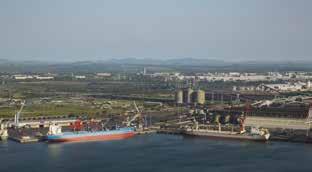
In reaction to the announcement in 2022 by Shell Downstream South Africa and bp Southern Africa of a “spend freeze” and a pause in operations at the SAPREF oil refinery in Durban, the Provincial Government of KwaZulu-Natal intends facilitating meetings with these companies and other interested parties to try to find a way to restart operations at this important facility. The refinery accounts for roughly 35% of the country’s refinery capacity and is likely to be offered for sale.
National Energy Regulator of South Africa: www.nersa.org.za Petroleum Agency SA: www.petroleumagencysa.com
Durban’s other oil refinery, Enref, was hit by a fire in December 2020 and there are plans to convert it to a storage facility. South Africa is a net importer of fuel and the Port of Durban handles 80% of South Africa’s fuel imports.The regulator and promoter of oil and gas exploration in South Africa, Petroleum Agency South Africa, has awarded coalbedmethane gas exploration rights in KwaZulu-Natal to NT Energy Africa, which has a partnership with the Central Energy Fund. These awards are for onshore exploration. Petroleum Agency SA is an agency of the National Department of Mineral Resources and Energy (DMRE) Eni, one of the world’s biggest energy companies, has an agreement with Sasol Petroleum International to explore for hydrocarbons off the coast of KwaZulu-Natal.
Getting fuel to the province of Gauteng is the key mission of the new multi-purpose pipeline (NMPP). Refined products such as jet fuel, sulphur diesel and both kinds of octane petrol are carried. The infrastructure of Transnet Pipelines is said to reduce the number of fuel tankers on South African roads by about 60%. ■
Battery storage has arrived in KwaZulu-Natal.
South Korean company Hyonsung Heavy Industries broke ground at Elandskop in December 2022, signalling the first project in Eskom’s Battery Energy Storage System (BESS) project. The 8MW facility will move to producing an additional 144MW in the second stage of the project.
A study into using solar energy to provide power for the Sundumbili Water Treatment Works in the iLembe District Municipality was conducted through the Vuthela iLembe LED Support Programme. Funded by the Swiss State Secretariat for Economic Affairs (SECO), the study found that the system, estimated to cost just over R5-million to build, would result in savings of about R4.8-million over a nine-year period.
This study is just one of several initiatives regarding energy taking place within the iLembe District Municipality. This was illustrated at a meeting held under the title “Synergy for Energy” hosted by Vuthela iLembe recently. There was interaction between business operators and provincial and municipal officials such as Sibusiso Jali, KwaDukuza Municipality Executive Director: Electrical Engineering Business Unit, pictured. Moves to improve the efficiency of the electricity supply to the coastal areas are starting to take shape was one of the conclusions, but stronger collaboration between the public and private sector is needed to secure reliable power.
Several alternative-energy options are being considered by the public and private sector to produce additional power. These include using waste heat generated by industry and biomass fuels using waste from forestry and natural gas.
Also in the district, an open-cycle gas turbine plant at Shakaskraal can be converted to gas-fired technology, a method which energy planners are encouraging. The 670MW plant came on stream in 2017. Its project company, Avon Peaking Power, is jointly owned by a community trust, Mitsui (Japan), Legend Power Solutions (South Africa) and ENGIE of France.
As part of the provincial government’s strategy to boost regional development, the iLembe District has been named as an Industrial Economic Hub (IEH) for the renewable energy sector.
The eThekwini Metropolitan Municipality has entered the
National Department of Energy: www.energy.gov.za
South African National Energy Development Institute: www.sanedi.org.za
iLembe District Municipality is taking action on energy.
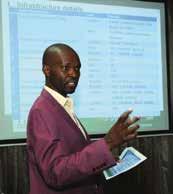
field of renewable energy provision with the publication of its eThekwini Integrated Resource Plan (EIRP). This document outlines the steps the city will take towards its cleaner energy goals.
Illovo Sugar SA is keen to produce biofuel and bioenergy and at the company’s Eswatini mill, Ubombo, it has a commercial supply agreement with the Eswatini Electricity Company.
Biomass technology is at the centre of the conversion scheme of South African Breweries at its Prospecton plant south of Durban. Methane-gas emissions from a nearby effluent plant are piped to the plant where they are converted to electricity. ■
Better cooling systems also help the environment.
UKZN’s School of Engineering offers nine areas of specialisation.
for industrial giants like Toyota and Defy.
When dairy company Clover decided to consolidate its national operations into just four plants, technological expertise was needed to make sure those factories were able to cope with greater demand.
One such company was Energy Partners Refrigeration (EPR) who were contracted to tackle a number of issues, including increased power requirements to higher refrigeration load as well as increased steam demand and pressure requirements.
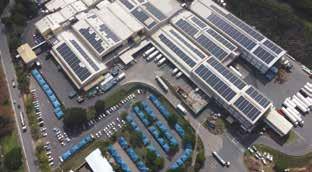
The upgrade of the cooling structure featured the installation of a new 10MW ammonia system and 16% of all the electricity used by the new system is generated by solar PV. An innovative aspect of the project, pictured, is that Clover has a Cooling-as-a-Service (CaaS) contract, a pay-per-use model that removes the large upfront investment cost as a barrier to improved efficiencies and improved environmental performance.
All of the province’s biggest industries require sophisticated engineering skills: aluminium smelters in Richards Bay and steel works in Newcastle, Richards Bay and Cato Ridge. There are also chemicals and plastics production plants, and large automotive works.
Marine repair and engineering are important, with established companies such as EBH South Africa offering comprehensive services at the ports of Durban and Richards Bay.
Dormac, which is headquartered in the Bayhead area of the Port of Durban, is best known for its marine engineering but it offers specialised services to the sugar industry and provides machinery
Consulting Engineers South Africa: www.cesa.co.za
Southern African Institute for Industrial Engineering: www.saiie.co.za
WASH R&D Centre: www.washcentre.ukzn.ac.za
One of the largest independent wire manufacturers in the country, Hendok Group, is steadily increasing its exports to other African countries. With more than 1 000 employees at the factory in the Phoenix Industrial Park in Durban, the company makes a wide variety of wires and is the country’s biggest producer of nails.
ArcelorMittalSA is Africa’s biggest steelmaker and it has a plant at Newcastle, but tough times in the steel business have meant that the company has shut down some of its facilities. The first to be shuttered was Saldanha in the Western Cape and an analysis of the profitability of other centres is underway.
A big project that has created a lot of work for engineers is the multi-year Western Aqueduct project to bring fresh water to greater Durban. The Transnet Engineering (TE) plant in the Port of Durban houses six business units and has 3 555 employees. The Port Equipment Maintenance unit and units specialising in wheels and locomotive overhaul are other entities.
The School of Engineering at University of KwaZulu-Natal (UKZN) offers a range of degree options in nine areas of specialisation including Bioresources, Chemical, Electronic and Computer Engineering and Land Surveying. ■
An off-grid, solar-powered groundwater harvesting system has been installed in Ekushane.
The Mayor of eThekwini was on hand to help launch the system together with a representative from Coca-Cola Beverages South Africa (CCBSA). The Coke Ville Project, pictured, was launched at several sites across South Africa in 2020 and not only harvests groundwater but treats it as well. Water wheelbarrows are distributed as part of the project to enable residents to transport water easily.
In the Harry Gwala District Municipality, an amount of R30million has been set aside for 28 solar-powered boreholes with elevated tankstands to be constructed. In the Umkhanyakude District, Mhlathuze has been appointed as the implementing agent to install boreholes across all four local municipalities. The water infrastructure servicing the coastal areas from Southbroom to Port Edward and the inland rural areas will receive more than R40million in upgrades and repairs.
In response to loadshedding, the iLembe District Municipality and two local municipalities, in partnership with the KwaZulu-Natal Department of Economic Development and Tourism and funded by the Swiss State Secretariat for Economic Affairs, has conducted a feasibility study into using renewable energy to abstract raw water from the lower Tugela River, treat it to safe drinkable standards and pump it to consumers in the Mandeni and KwaDukuza municipalities.
A provincial Water Intervention Plan is being rolled out in hotspots where municipalities are struggling to provide consistent services. The main pipelines of Kokstad and Underberg are receiving upgrades, as are the water supply systems at Bergville, Skhemelele and Moyeni Zwelisha.

The area north of the Durban central business district is one of the fastest-growing urban areas in South Africa, with a number of large office and accommodation projects going ahead simultaneously. This is a welcome development for the economy, but the new buildings also create pressure on infrastructure.
The multi-year, R250-million Northern Aqueduct Augmentation project was initiated in 2014 and the fifth phase of the project is underway. This will provide water for Durban North, Umhlanga, Newlands, KwaMashu, Phoenix and Cornubia.
National Department of Water and Sanitation: www.dws.gov.za
Umgeni Water: www.umgeni.co.za
Water Research Commission: www.wrc.org.za
Municipalities are upgrading infrastructure.
Umgeni Water currently supplies seven municipalities, including the eThekwini Metropolitan Municipality which includes Umlazi and Durban.
Large parts of the northern part of the province are served by Mhlathuze Water. The utility has assets valued at more than R3-billion and its area of supply covers 37 000m².
New technology has been installed at the Verulam Wastewater Treatment Works of the eThekwini municipality. Murray & Roberts Water and its European technology partner, Organica Water, has installed an environmentally friendly system that uses 30% less energy and produces 30% less sludge. ■
Durban’s old buildings are getting a new life.
The regeneration of Durban’s centre is happening one building at a time. The Inner City Regeneration Programme of the eThekwini Metropolitan Municipality reported on good progress on 33 identified buildings in 2022. Introduced in 2021 to eradicate problem buildings, the programme aimed to see property owners, the Department of Public Works and Transnet working together.
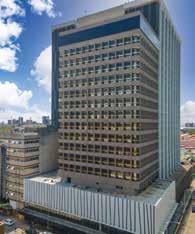
An investment of R270-million in water supply and sanitation in the Point Precinct and Anton Lembede Street is underway and public spaces on Mahatma Gandhi Road have been upgraded.
A private developer has been busy repurposing inner-city buildings. In 2019 the Garlicks department store building was relaunched as the new HOMii building with 145 flats. Since then Urban Lifestyle Investment, again through its HOMii brand, has opened The Watt Club, pictured, which offers studio and one- and two-bedroom apartments, a gym, a rooftop social area, games lounge, co-working spaces and a laundry. Flats can be bought or there is a rent-to-buy option.
The Mid-South Coast does not have anything like the same number of estates as the North Coast, but that is about to change. Renishaw Property Developments controls 1 300ha which it has started releasing into the market. The Renishaw Coastal Precinct near Scottburgh will eventually have five multi-use nodes and the aim is for them to be self-sufficient in water supply and power generation. Two sites of Node 1 were released in 2023 and have been marketed as ideal sites for eco-estates. The sites are near the road leading to Renishaw Hills, a 25ha mature lifestyle estate with more than 300 residents and about R400-million in sales to date.
Tongaat Hulett Developments (THD) has for some years been rolling out a series of developments on land it owns and it has launched the nTshongweni Urban Development on either side of the busy N3 highway west of the city.
Investec Property is behind a major new development, The Brickworks, strategically located between the Port of Durban and King Shaka International Airport.
The R2-billion first phase, on which construction will start in the middle of 2022, will see the old Corobrik factory site
Construction Industry Development Board: www.cidb.org.za
Master Builders Association KwaZulu-Natal: www.mba-kzn.co.za
SA Estate Agency Affairs Board: www.eaab.org.za
transformed into a business and logistics park. Once the project is complete there will be more than 450 000m² of leasable space.
KwaZulu-Natal has a number of brick companies and four cement factories. Three of these are run by NPC at Simuma, Durban and Newcastle, and the company has a further six sites for concrete and two for aggregate. NPC is part of the Intercement group. Lafarge has several aggregate quarries and eight Readymix plants around the province. The company’s grinding operation in Richards Bay has closed. ■
Land is being released for estate developments.Small studios are taking centre stage.
Small film production companies celebrated in 2023 when the Micro Budget Film Fund of the Durban Film Office (DFO) handed over five substantial cheques to allow them to bring their projects to completion and achieve high production standards.
Cheques of R250 000 were presented at a ceremony at the Barnyard Theatre Suncoast on 19 May 2023. Among the recipients were BTS Films (Pty) Ltd which secured funding for “The Life Between Us”, while Lwazi Duma Entertainment received support for “Thulebone” and Umqhele Films (Pty) Ltd was awarded funding for its project, “Amalootist” (Youth in the midst of war).
This initiative aims to invigorate the growth of Durban’s film industry and provide vital support to emerging local filmmakers by fostering a platform for their talent to flourish. Celebrating its 20th anniversary in 2023, the DFO has played a pivotal role in positioning Durban as a globally competitive film city.
The DFO has two other development programmes targeting filmmakers at different levels in the industry: the Development Fund Grant and Festivals and the Markets Support Grant. Together, these programmes aim to support intermediate and experienced producers and local emerging filmmakers based in Durban. Also, to provide opportunities for skills development and market access, expose local talent to international audiences and to promote local films.
The KZN Film Industry Transformation Initiative (FITI) is another strategy to support previously disadvantaged and emerging filmmakers. Administered by the KwaZulu-Natal Film Commission, the one-year FITI aims to increase skills levels with a view to individuals being able to advance to senior positions within the industry.
The first edition of the Durban International Film Festival (DIFF) was held in 1979 and its reputation has been building ever since. In 2023, 3 000 films from 137 countries were viewed over 10 days. Presented by the Centre for Creative Arts at the University of Kwazulu-Natal, a number of prizes are on offer, including Best Feature Film, Best African Feature Film, Best South African Feature Film and Best Documentary. The programme also encompasses the Isiphethu International Student Film Festival, open to filmmakers
Durban Film Office: www.film.durban.gov.za
Centre for Creative Arts: www.cca.ukzn.ac.za
Durban Film Mart: www.durbanfilmmart.co.za
KwaZulu-Natal Film Commission: www.kznfilm.co.za
The 45th Durban International Film Festival will be held in 2024.

at tertiary institutions. The 45th edition of the DIFF will be held in July 2024.
The Durban FilmMart Institute hosts an annual Durban FilmMart that in 2023 attracted 1 018 delegates from 43 countries. The four-day industry event is a finance and co-production market designed to create partnerships and further the development and production of African cinema. In 2023 it was held under the title of “African Constellations” and featured 28 official projects, seven partner projects and 44 industry sessions. Primary funding is received from the Durban Film Office and the eThekwini Municipality. ■


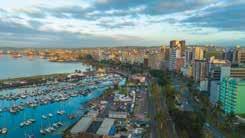


New flights and upgraded airports are boosting tourism.
Turkish Airlines returned to King Shaka International Airport in 2022. Two of the airline’s Istanbul-Johannesburg flights now extend to Durban on Thursdays and Saturdays and it has plans to increase these to four weekly flights.
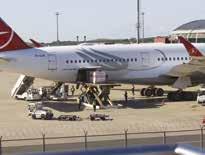
A new direct flight from Durban to Harare in Zimbabwe was launched by Airlink in April 2022. Durban Direct, the KZN Route Development Committee, arranged a water-canon salute as the first plane touched down with a full load of passengers. These new flights are in addition to Emirates flying five flights a week from Durban directly to Dubai and the four-weekly direct flights that Qatar Airways offers.
The project to improve regional airports is continuing. Upgrades at Pietermaritzburg, Newcastle and Richards Bay have been authorised and terminals at Margate and Mkuze, where R72-million was spent, have been completed. Located in the far north of the province, Mkuze holds great potential for the distribution of agricultural produce into the SADC market and for tourism, given its proximity to several private reserves and the iSimangaliso Wetland Park.
The KwaZulu-Natal Convention Bureau reports that 26 major conferences, exhibitions and meetings were held in the province in 2021/22, resulting in a direct local economic impact of about R220-billion. Africa’s Travel Indaba 2022 attracted 3 700 delegates.
Radisson Blu Hotel, Durban Umhlanga, shortly after celebrating its one-year anniversary in July 2023, received two awards from Durban Tourism, the Visitor Experience and Restaurants Award as well as the Meetings, Exhibitions and Special Events (MESE) Award.
The Docklands Hotel at the Durban Waterfront is a four-star Signature development that cost about R100-million to develop.
Hotels are located at each of Tsogo Sun’s three casinos in the province, with two at Suncoast Casino Hotels & Entertainment. Southern Sun runs 13 establishments in KwaZulu-Natal, with Durban (five) and Umhlanga (four), making up the majority.
Premier Hotels & Resorts has nine properties in the province, including two recently built in Umhlanga on land bought during the Covid-19 pandemic. The group has also restored the Cutty
Durban International Convention Centre: www.icc.co.za
Ezemvelo KZN Wildlife: www.kznwildlife.com
Tourism KwaZulu-Natal: www.zulu.org.za
The MESE sector generated R20-billion in 2021/22.
Sark in Scottburgh. The Royal Hotel in the heart of Durban is one of eight Three Cities Group hotels in the province. The Golden Horse Casino Hotel is a Three Cities property, and the Group administers the International Hotel School in Westville that also hosts the Christine Martin School of Food and Wine.
IFA Hotels & Resorts runs several luxury properties including the Zimbali Coastal Resort and Zimbali Lakes Resort.
Signature Life Hotels has 13 properties and Gooderson Leisure has a varied portfolio. Sibaya Casino and Entertainment Kingdom is north of Durban and there are casinos in Newcastle (Century City), Empangeni (Tusk Umfolozi Casino) and Pietermaritzburg (Golden Horse Casino). ■
Ezemvelo KZN Wildlife has become the first government entity in the province to receive a Remotely Piloted Aircraft System Operations Certificate from the South African Civil Aviation Authority.
Not only will rangers be able to check on the condition of rhinos threatened by poachers, but being able to deploy drones will assist research efforts, promote marketing and allow for more detailed inspections more often.
A group of young people from KwaDukuza and Mandeni Local Municipalities have completed their one-year, SETA-accredited training under the iLembe ICT project, which will enable them to design and develop websites and apps.

The digital training programme was managed by the Vuthela iLembe LED Support Programme in partnership with Enterprise iLembe, the district’s economic development agency, the Moses Kotane Institute and the youth managers of both municipalities.
The graduation, pictured, formed part of a one-day event titled “Let’s Talk Youth Entrepreneurship” hosted by Enterprise iLembe where opportunities in the Green Economy and in the digital world were discussed.
South Africa became better connected to Mauritius, Madagascar and Reunion in 2023 when Liquid Intelligent Technologies South Africa deployed its MTEL T3 subsea cable on Amanzimtoti’s Pipeline Beach. The company will host and manage the submarine cable and provide the fibre-landing facility that will house two subsea cables.
A provincial strategy for creating smart cities is targeting three districts: Ugu (Ray Nkonyeni Local Municipality as anchor), iLembe (KwaDukuza) and Richards Bay (uMhlathuze).
Broadband Infraco is providing layer two network services to Dube TradePort to provide over 810 WiFi hotspots at 405 selected sites across the province.
Over the next five years, the Moses Kotane Institute, another subsidiary of the KZN Department of Economic Development, Tourism and Environmental Affairs, will connect several rural communities. Hubs are expected to be functional in Community
Dube TradePort: www.dubetradeport.co.za
Information Technology Association of South Africa: www.ita.org.za
SmartExchange: www.smartxchange.co.za
South African Vanguard of Technology: www.savant.co.za
Service Centres to improve public access to digital services.
South African Vanguard of Technology (Savant) is a Department of Trade, Industry and Competition (dtic) programme. It is the marketing and awareness programme for the South African ICT and electronics sector. The aim is to develop South African exports and to attract foreign investment. It houses a venture fund and an incubator.
A SmartXchange SMME Incubator has been launched in Port Shepstone on the South Coast. The concept of ICT has been expanded to include media and electronics, so the hub is called an MICTe Incubator.
The province’s SmartXchange is an example of a successful publicprivate partnership that supports businesses in the information technology and communications sector. Incubation strategies for startups and skills development (including links to educational institutions) are important parts of the organisation’s brief. ■
Two new Special Economic Zones are planned.
Akey component of the economic policies of KwaZulu-Natal and South Africa is the support of Special Economic Zones (SEZs). In addition to its two existing zones, the province wants to establish two new ones.

Leather and textiles will be the focus of the planned SEZs in the Newcastle-Ladysmith corridor, an area where those industries already flourish. The province’s two established zones, Dube TradePort (at King Shaka International Airport, pictured) and Richards Bay Industrial Development Zone (RBIDZ) are attracting investments in a range of targeted sectors, agricultural exports and logistics, manufacturing and energy, among others.
TradeZone2 at Dube TradePort has been completed and has started attracting investors. These include:
• Futurelife, food-processors, R57-million
• LM Diapers, expansion of plant, R75-million
• Synergy Blenders, chemical manufacturing, R93-million
KwaZulu-Natal is the second-largest manufacturing centre in South Africa, contributing 21% to national manufacturing GDP. The strongest export sectors are base metals (32% including aluminium), mineral products such as ores, vehicles and chemical products.
The sector is also a major contributor to the eThekwini Municipality GDP. The city’s economy grew 4.9% in 2021, 73% of which came from manufacturing, finance, business and trade.
“Manufacturing is responsible for 20% of the employment opportunities in eThekwini which translates to 176 000 jobs of which 83% are semi-skilled,” says Takalani Rathiyaya, Head of the Economic Development Programmes Department at the eThekwini Municipality. Over the last five years the municipality established four manufacturing clusters that collectively have over 200 member firms.
Through the Durban Chemicals Cluster, Durban Automotive Cluster, KZN Clothing and Textiles Cluster and eThekwini Furniture Cluster, a number of programmes are tackling challenges and attempting to stimulate growth. As Takalani explains, “Though we are only a couple of years into our industrial recovery plan, we are
Aluminium Federation of South Africa: www.afsa.org.za
Chemical and Allied Industries’ Association: www.caia.co.za
Enterprise iLembe: www.enterpriseilembe.org.za
seeing the first green shoots in harnessing the industry’s potential to create highincome jobs, boost upstream development of local businesses as well as benefit from the multiplier effect for both formal and informal workers.”
Sappi’s massive Saiccor Mill on KwaZulu-Natal’s South Coast is one of the province’s largest processing facilities.
Aluminium producer Hulamin experienced reduced demand during the Covid-19 lockdowns but has secured a number of good orders, including to supply product to a US manufacturer of electric vehicles. Hulamin had previously laid off some workers and closed one of its factories in another province. The company believes that its restructuring is working well, and its beverage business is thriving. Hulamin also makes rolled products at Edendale, Pietermaritzburg and Camps Drift.
LG Electronics South Africa has opened a R21-million factory and distribution centre in Cornubia, north of Durban. ■
The Durban Automotive Cluster (DAC) aims to drive competitiveness and transformation in the sector. Another important role is to promote training. One such series of training sessions culminated in a graduation ceremony for more than 400 graduates from the DAC and other similar groups in May 2022.
Participants are trained by a private contractor, B&M Analysts, through its Skills Development division which runs the Team Leader Development Programme (TLDP) and Emerging Leader Development Programme (ELDP).
At the graduation Natalie Kotze, from Bell Equipment, reported how she had used what she learnt on her course to reduce the amount of time it takes to manufacture a tube by 43% and free up more than 90 hours of team capacity.
A new programme introduced by DAC is TLDP Blitz Fundamentals Training, a two-day course that focusses on waste reduction and process optimisation. Participants receive a certificate on completion.
The DAC is working with firms and their supply chains to understand and map their carbon emissions at Scopes 1, 2 and 3 levels. The aim is to see if collaboration between firms in the same supply chain can help to reduce their carbon emissions and support the drive towards a net-zero future. KwaZulu-Natal has a substantial automotive components sector which includes large manufacturers such as GUD Filters.
In line with the policy of developing Industrial Economic Hubs, the Durban Automotive Supplier Park is planned at Illovo, south of Durban and near to the Toyota manufacturing plant. The Dube TradePort Corporation will manage the project, which covers 1 013ha. Other partners are the eThekwini Municipality, Toyota and the provincial government but the major floods which hit the province in 2022 have slowed progress on the project.
Toyota’s plant, just a few kilometres south of the harbour at Prospecton, received a R2.4-billion investment to produce the Corolla Cross which started production in 2021. Toyota sells about a quarter of the vehicles sold in South Africa, and accounts for the same proportion of export volumes. The company’s total investment
Automotive Industry Development Centre: www.aidc.co.za
Durban Automotive Cluster: www.dbnautocluster.org.za
National Association of Automotive Component and Allied Manufacturers (NAACAM): www.naacam.co.za
of R4.2-billion between 2019 and 2021 includes other manufacturing projects and a huge increase in warehousing capabilities.
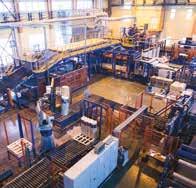
The other large-scale original equipment manufacturer in the province is Bell Equipment. Between the Toyota plant and the Richards Bay facility of heavyequipment manufacturer Bell Equipment, upwards of 11 000 people are employed.
Another manufacturer of earthmoving equipment is at Port Shepstone on the South Coast. Dezzi is part of the Desmond Group of companies that was founded in 1973 and now has 18 offices and branches. The Dezzi CMI backhoe loader is a popular part of the company’s range. ■
Carbon emission mapping is underway.Graduating as Handypersons will boost employment chances.
UKZN has close to 40 000 students.
The college offers a range of national business and engineering programmes which include the National Certificate (Vocational) and N4-N6 Diploma programmes. KwaZulu-Natal has nine Technical and Vocational Education and Training (TVET) Colleges with a total enrolment of about 80 000.
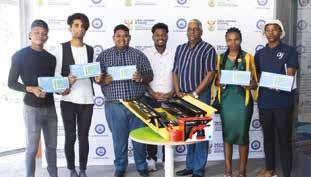
Adouble graduation took place at the end of 2022 at the uMfolozi TVET College at the Installation, Repair and Maintenance (IRM) Hub in Mandeni. The 43 students graduating as Assistant Handypersons were joined by 10 candidates from the Artisan Recognition Prior Learning Programme (ARPL), whereby candidates’ prior learning and experiences is acknowledged through formal certification. All graduates were awarded with a toolkit and a tablet to assist them in starting their own businesses.
The IRM Hub is supported by the National Business Initiative, GIZ, the German development agency, Sappi and the Swiss State Secretariat for Economic Affairs, which also supports the Vuthela iLembe LED Support Programme.
The hub aims to expand opportunities for job retention and job growth across a range of sectors such as domestic appliance repairs, autobody repairs, cellphone repairs, plumbing, electrical and general maintenance. It is SETA-accredited to offer trade tests for electrician, fitter, fitter and turner and instrument mechanic.
Of the 10 ARPL graduates, seven qualified as electricians and three qualified as fitters.
uMfolozi College has eight main campuses: Chief Albert Luthuli, Eshowe, Esikhawini, Mandeni and Richtek, Sundumbili/Isithebe, Bambanana and Nkandla. There are a further six skills centres.
Coastal KZN TVET College gives students practical experience through facilities such as the Nongalo Industrial Park. The college hosts the Samsung Engineering Academy, a Tooling Centre of Excellence and a manufacturing plant for sanitary towels. The college has several sites on the South Coast and caters for 15 400 students.
Majuba TVET College is a Centre of Specialisation for boiler-making. The Mnambithi TVET College is located in the Battlefields Route tourism area and offers National Diploma courses in tourism, among other qualifications. A satellite campus operates at Estcourt.
There are two universities and two universities of technology in KwaZulu-Natal, and the
national distance university, the University of South Africa (Unisa), has a presence in five locations. USB Executive Development offers business courses for executives.
UKZN has close to 40 000 students studying on five campuses in two cities. Greater Durban hosts Howard College, Berea (environment, engineering, law, humanities) and the Nelson Mandela School of Medicine at Congella. The UKZN administration and the Graduate School of Business are based at Westville (also science, engineering and health) whereas the Edgewood, Pinetown, campus focusses on education.
The Pietermaritzburg campus offers a broad academic programme but its specialities are fine art, theology and agriculture. UKZN also hosts the National Research Foundation.
The Durban University of Technology (DUT) has six faculties operating in seven campuses in Durban and in the Midlands. DUT is well known for its outstanding graphic-design school and offers one of only two chiropractic programmes in South Africa.
The University of Zululand offers diploma and degree courses on two campuses at Empangeni and Richards Bay.
Several provincial government departments make tertiary bursaries available to qualifying students, including Agriculture and Rural Development, Human Settlements, Public Works, Transport and the Treasury. The National Student Financial Aid Scheme (NSFAS) supports 26 public universities across the country in advancing payment of registration fees for poor students.
The private sector also actively supports education through bursaries. A crowdfunding platform set up by Standard Bank, the Feenix Trust, raised more than R35-million in three years to support more than 1 000 students. The bank’s Ikusasa Student Financial Aid Programme (ISFAP) provides bursaries for students from families earning less than R600 000 per annum.
KwaZulu-Natal has 2.8-million school pupils, many of whom are in rural areas. With 30% of South Africa’s pupils in its schools, the province’s results have a big bearing on how the nation fares in annual examinations. There is now near universal access to primary and secondary schooling and a new drive to enrol pre-school children in Grade R has achieved
KwaZulu-Natal Department of Education: www.kzneducation.gov.za
National Research Foundation: www.nrf.ac.za
National Skills Authority: www.nationalskillsauthority.org.za
uMfolozi TVET College: www.umfolozicollege.co.za
a 70% success rate. The province has 1 689 early childhood development centres. Transport is provided to 350 schools, covering 59 000 pupils, and 2 400 bicycles have been made available under the Shovakalula programme.
A primary school in the Harry Gwala District was the site of the launch of an e-learning infrastructure programme that is intended to be rolled out to rural areas throughout the province. Digital access will allow pupils in remote areas to be connected to the best teachers in the province.
The unbundling from the successful Curro group of a separate tertiary entity which listed on the JSE as Stadio Holdings is a good indicator of the growth of the private sector in education.
Stadio currently has three institutions: Southern Business School, AFDA (the School for the Creative Economy) and the Embury Institute for Higher Education which has a campus in Musgrave, Durban. There are seven schools in KwaZulu-Natal operating under Curro brands.
Advtech, the other big private company in the sector, already has 27 tertiary campuses nationally, in addition to its 78 schools operating under a variety of labels. Advtech operates 10 educational sites in KwaZulu-Natal, including schools such as Crawford and Trinity House, a chefs’ school (Capsicum), three Varsity Colleges and the Design School for Southern Africa. ■
Small businesses are thriving on the Wild Coast.
the eThekwini Furniture Cluster. The programme has resulted in 45 black-owned SMMEs signing commercial agreements with leading manufacturers, delivering R3.6-million in new market opportunities and 250 new jobs. The intention is to be supporting 2 000 SMMEs by 2025, with 200 new contracts in place with the formal manufacturing sector.
The Enterprise and Supplier Development programme of the Wild Coast Sun is having a big impact.
Self-taught graphic designer Siphokazi Nogojela has seen her business, Poshy A Printing and Branding, grow tremendously since she teamed up with the hotel who provided her small business with an industrial printing machine and access to training. She now employs five staff members between her offices at Msizazwe and Wild Coast Sun.
Having worked at Wild Coast Sun as a seamstress, Pamela Gumede submitted a business plan to the hotel in 2021 and now GPN Amangunie Trading Company employs four seamstresses from a rent-free space within the complex. Her latest order is for 700 sheets and 1 700 pillows.
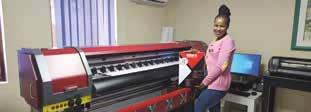

Since an SMME conference was hosted at the Wild Coast Sun in 2022, Sun International has put about 15 new SMMEs on its books as new suppliers and businesses which it supports.
At Africa’s Travel Indaba in May 2022, 22 local SMMEs were invited to display their offerings to 3 700 South African, African and overseas delegates and guests.
As part of the cluster initiative of the eThekwini Municipality, there is a specific SMME programme called Business Accelerators. These are sector-specific and run by the Durban Chemicals Cluster, Durban Automotive Cluster, KZN Clothing and Textiles Cluster and
The provincial government’s Sukuma 100 000 surpassed its target by creating 137 000 job opportunities in 2021, with all government departments participating in focussing on opportunities for youth employment. Examples of companies that received support under the project are Gelanison Agric, an agricultural initiative that produces high-value crops using the hydroponic system, and AdNotes, a telecommunications company which is 100% black and youthowned. The company received funding from the KZN Youth Fund and provides Internet services in the Ugu and King Cetshwayo Districts and eThekwini Metro.
Operation Vula Fund is an SMME grant funding scheme run by the
KwaZulu-Natal Department of Economic Development, Tourism and Environmental Affairs (DEDTEA). A total of 1 016 applications worth R339.2-million were approved for funding in the first window in various sectors of the economy.

In the year to 31 December 2022, the Ithala Development Finance Corporation disbursed R146-million to 293 SMMEs and co-operatives. This created 1 297 job opportunities.
For the 2023/24 financial year the Youth Fund will deploy R100million to support businesses that are seen to create jobs. The provincial government is teaming up with Sumitomo to create smart centres and co-operatives to be run by young people. The intention is to promote local economic growth in the tyre sector.
Funding from the National Department of Trade, Industry and Competition’s (dtic) Black Industrialist Programme and from the Industrial Development Corporation (IDC) secured 70% of Newcastlebased Boschpick Engineering for entrepreneurs Bongani Khumalo and Phillip Majali and their company Lipsobex. The IDC provides finance across a range of sectors, from agriculture to tourism.
The Small Enterprise Development Agency (Seda) is active in supporting entrepreneurs. Seda gives non-financial support through training, assistance with filling in forms, marketing and creating business plans.
In KwaZulu-Natal, Seda runs 12 Incubators which either help new businesses get started or with the rehabilitation of existing enterprises. Three models are used: Technology Demonstration Centres (demonstration and training); Technology Incubators (where the focus is rehabilitation); Hybrid Centres, which combine elements of the other two models. The KwaZulu-Natal incubators include ICT and construction (three centres each), furniture and hi-tech (two each) and chemicals and essential oils.
Digital know-how is potentially going to make a big difference for the business that Zamalinda Mbatha runs. Her skincare products are made from natural products found where she lives in KwaDukuza but unemployment in the area is high so local sales are limited. With a SETA-accredited ICT certificate in hand, she intends to build her own website for her skincare products business and grow her market online. The one-year course from which Zamalinda graduated was run by the iLembe ICT project.
Sappi is helping honey-makers make money. A project run jointly by Sappi and the African Honey Bee programme is supporting about 100 beekeepers in Northern KwaZulu-Natal and encouraging them
National Department of Small Business Development: www.dsbd.gov.za
SA SME Fund: www.sasmefund.co.za
Small Enterprise Development Agency: www.seda.co.za
to invest in sources of income such as vegetable gardens that can keep their families going between honey harvests. A benefit to Sappi is that fires which used to be used as a method of smoking out bees has largely been eliminated, reducing the risk to Sappi’s plantation assets.
The sugar industry’s R1-billion, five-year plan to transform the sector will have positive spinoffs for small-scale growers and distributors.
Contributions from millers and growers have allowed for sums of R165million (transformation) and R60-million (Value Chain Masterplan) to be allocated as the first part of the scheme. National government supported these measures with initiatives of its own, including providing input vouchers to small-scale growers. The aim is to reach up to 250 000 small-scale farmers (including the 21 000 contributing to the sugarcane value chain), in partnership with the private sector. ■
KWAZULU-NATAL BUSINESS 2023/24 PHOTO: iLembe ICT Project Zamalinda Mbatha will use her ICT training to boost her business.TymeBank is spreading its wings.
The Competition Tribunal has unconditionally approved TymeBank’s purchase of Retail Capital, a fintech SMME funder.

TymeBank, which is majority owned by Patrice Motsepe’s African Rainbow Capital, has been moving beyond its basic banking model recently and this purchase indicates another broadening of the scope of the bank’s ambitions. Having run banking kiosks within Pick n Pay and Boxer stores for several years, TymeBank has also signed a deal with TFG, a group that has a big presence in KwaZulu-Natal.
What used to be known as the Foschini Group has 34 brands, including Markhams, Totalsports, Jet and Dial a Bed, and 30-million customers. In the short term, TymeBank will have access to 600 TFG kiosks, taking the bank’s total in South Africa to 1 450.
The launch by Sanlam Investments of a Sustainable Infrastructure Fund is a sign of the times. The South African state and the Provincial Government of KwaZulu-Natal has promised a huge infrastructure drive but in the context of climate change caused by the use of fossil fuels, the investment community is increasingly putting emphasis on sustainability.
The Brics New Development Bank has made a $200-million loan for the expansion of the container terminal in Durban. The busy port is currently stretched beyond capacity and waiting time for trucks can be extremely long.
Activist groups in Durban’s southern suburbs are opposing the loan and the expansion, saying that further development will increase pollution in the area and lead to even more dangerous traffic congestion.
Up the coast at Richards Bay, the World Bank’s International Finance Corporation (IFC) has committed $2-million to a feasibility study on the construction of a liquefied natural gas (LNG) storage and regasification terminal. The study’s costs are shared with Transnet and a private investor will be sought if the feasibility study is positive.
Aspen Pharmacare is a speciality pharmaceuticals company with a presence in more than 50 countries and nearly 9 000 employees. The company’s headquarters are in La Lucia Ridge north of Durban. Aspen’s decision to register a second listing on one of South Africa’s
Association for Savings and Investment South Africa: www.asisa.org.za
Financial Sector Conduct Authority: www.fsca.co.za
South African Institute for Chartered Accountants: www.saica.co.za
Sustainability has a financial component.
newest stock exchanges (the primary listing remains on the JSE) was a boost for A2X, which set out to attract secondary listings.
Of the four new exchanges that South Africa has seen since 2017, ZARX has been suspended and 4AX has rebranded as the Cape Town Stock Exchange. Equity Express Securities Exchange (EESE) trades in Black Economic Empowerment (BEE).
Together with real estate and general business, the financial sector in KwaZuluNatal accounts for 18% of gross domestic product (GDP). ■
A guide to KwaZulu-Natal’s provincial government departments. All addresses are located in Pietermaritzburg (code 3201) unless stated otherwise. Visit www.kznonline.gov.za.

Office of the Premier
Premier: Nomusa Dube-Ncube
Moses Mabhida Building, 300 Langalibalele Street
Tel: +27 33 341 3300
Agriculture and Rural Development
MEC: Super Zuma
Cedara College, 1 Cedara Road
Tel: +27 33 335 9100
Website: www.kzndard.gov.za
Community Safety and Liaison
MEC: Sipho Emmanuel Hlomuka
179 Jabu Ndlovu Street
Tel: +27 33 341 9300
Website: www.kzncomsafety.gov.za
Cooperative Governance and Traditional Affairs
MEC: Bongiwe Sithole-Moloi
330 Langalibalele Street
Tel: +27 33 260 8255
Website: www.kzncogta.gov.za
Economic Development, Tourism and Land Affairs

MEC: Siboniso Armstrong Duma
270 Jabu Ndlovu Street
Tel: +27 33 264 2500
Website: www.kznedtea.gov.za
Education
MEC: Mbali Frazer
Anton Lembede Building, 247 Burger Street
Tel: +27 33 846 5000
Website: www.kzneducation.gov.za
Health
MEC: Nomagugu Simelane
11th Floor, Natalia Building, 330 Langalibalele Street
Tel: +27 33 395 2111
Website: www.kznhealth.gov.za
Human Settlements
MEC: Sipho Nkosi
203 Church Street
Tel: +27 33 392 6400
Website: www.kzndhs.gov.za
Provincial Treasury
MEC for Finance: Peggy Nkonyeni
Treasury House, 145 Chief Albert Luthuli Street
Tel: +27 33 897 4200
Website: www.kzntreasury.gov.za
Public Works
MEC: Sipho Nkosi
Oliver Tambo House, 191 Prince Alfred Street
Tel: +27 33 355 5500
Website: www.kznworks.gov.za
Sports, Arts and Culture
MEC: Dr N Mahlaba
135 Pietermaritz Street
Tel: +27 33 342 6300
Website: www.kzndac.gov.za
Social Development
MEC: Nonhlanhla Mildred Khoza
205 Pietermaritz Street
Tel: +27 87 158 3000
Website: www.kzndsd.gov.za
Transport
MEC: Sipho Hlomuka
Inkosi Mhlabunzima Maphumulo House, 172 Burger Street
Tel: +27 33 355 8600
Website: www.kzntransport.gov.za
5th Floor, Telkom Building, 300 Langalibalele Street
province has excellent game and nature reserves.
Tel: +27 33 341 3300
Fax: +27 33 331 7368
Anton Lembede Building, 247 Burger Street
Isimangaliso Wetland Park is a World Heritage Site and helps to fund 80 small businesses associated with its business as a tourist site.
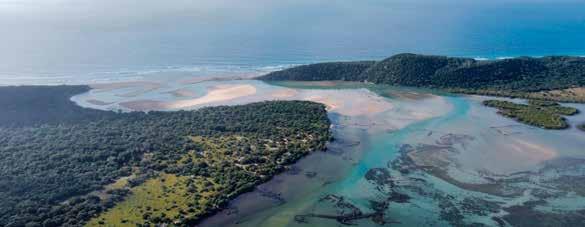
Tel: +27 33 846 5000 | Fax: +27 33 355 1293
Website: www.kzneducation.gov.za
Amajuba Newcastle
Agriculture and Rural Development
MEC: Bongiwe Nomusa Sithole-Moloi
Harry Gwala Ixopo
Cedara College, Cedara Road
Tel: +27 33 335 9100
iLembe KwaDukuza
Fax: +27 33 343 8255
Website: www.kzndard.gov.za
King Cetshwayo Richards Bay
Municipality; Mkhambathini Local Municipality; Mpofana Local Municipality; Msunduzi Local Municipality; Richmond Local Municipality; uMngeni Local Municipality; uMshwathi Local Municipality
Arts and Culture
Ugu
The building of the King Shaka International Airport to the north of Durban allows tourists to get to superb beaches and game farms very quickly, and the airport has its own industrial development zone, the Dube TradePort. New international direct flights have been announced; 4.5-million passengers passed through the airport in 2014/15, almost 300 000 of whom were foreign visitors or tourists (ACSA).
Port Shepstone
MEC: Hlengiwe Goodness Slindile Mavimbela
UMKHANYAKUDE DISTRICT MUNICIPALITY
222 Jabu Ndlovu Street
Principal city: Mkuze
Health
MEC: Nomagugu Simelane-Zulu
1st Floor, 330 Langalibalele Street
Tel: +27 33 395 2111
Website: www.kznhealth.gov.za
Human Settlements and Public Works
MEC: Neliswa Peggy Nkonyeni
203 Church Street
uMgungundlovu Pietermaritzburg
Tel: +27 33 264 3400
Physical address: Harlingen No.13433, Kingfisher Road, Mkuze



Fax: +27 33 394 2237
uMkhanyakude Mkuze
Tel: +27 33 392 6400 | Fax: +27 33 392 6490
Website: www.kznworks.gov.za
Postal address: PO Box 449, Mkuze3965
Website: www.kzndac.gov.za
Tel: +27 35 573 8600
uMzinyathi Dundee
Community Safety and Liaison
MEC: Thomas Mxolisi Kaunda
uThukela Ladysmith
179 Jabu Ndlovu Street
Provincial Treasury
Website: www.ukdm.gov.za
Local municipalities: Big 5 Hlabisa Local Municipality; Jozini Local Municipality; Mtubatuba Local Municipality; uMhlabuyalingana Local Municipality
Zululand Ulundi
Tel: + 27 33 341 9300
The mixed topography of the province allows for varied agriculture, animal husbandry and horticulture. The lowland area along the Indian Ocean coastline is made up of subtropical thickets and Afromontane Forest. High humidity is experienced, especially in the far north, and this is a summer rainfall area. The centrally located Midlands is on a grassland plateau among rolling hills. Temperatures generally
Fax: + 27 33 342 6345
UMZINYATHI DISTRICT MUNICIPALITY
Website: www.kzncomsafety.gov.za
Principal city: Dundee
Physical address: 39 Victoria Street, Princess Magogo Building, Dundee
Cooperative Governance and Traditional Affairs
Postal address: PO Box 1965, Dundee 3000
Tel: +27 34 219 1500
MEC: Sipho Hlomuka
Website: www.umzinyathi.gov.za
330 Langalibalele Street
Tel: +27 33 395 2831
MEC for Finance: Ravigasen Ranganathan Pillay
Treasury House, 145 Chief Albert Luthuli Street, Tel: +27 33 897 4200 | Fax: +27 33 342 2486
Website: www.kzntreasury.gov.za
Sport and Recreation
MEC: Hlengiwe Goodness Slindile Mavimbela
Website: www.uthukela.gov.za
135 Pietermaritz Street
Tel: +27 33 897 9400
Local municipalities: Alfred Duma Local Municipality; Inkosi Langalibalele Local Municipality; Okhahlamba Local Municipality
Website: www.kzn.dsr.gov.za
ZULULAND DISTRICT MUNICIPALITY
Local municipalities: Endumeni Local Municipality; Nquthu Local Municipality; uMsinga
Local Municipality; Umvoti Local Municipality
Fax: +27 33 345 6432
Website: www.kzncogta.gov.za
UTHUKELA DISTRICT MUNICIPALITY
Principal city: Ladysmith
Economic Development, Tourism and Land Affairs
Physical address: 36 Lyell Street, Ladysmith

Postal address: PO Box 116, Ladysmith 3370
Tel: +27 36 638 5100
MEC: Nomsa Dube-Ncube
270 Jabu Ndlovu Street
Tel: +27 33 264 2500 | Fax: +27 331 310 5416
Website: www.kzndedt.gov.za
Social Development
Principal city: Ulundi
MEC: Nonhlanhla Mildred Khoza
Physical address: 400 Ugagane Street, Ulundi
Postal address: Private Bag X76, Ulundi 3838
208 Hoosen Haffejee Street
Tel: +27 35 874 5500
Tel: +27 33 264 5402
Website: www.zululand.org.za
Fax: +27 33 341 9610
Website: www.kzndsd.gov.za
Local municipalities: AbaQulusi Local Municipality; eDumbe Local Municipality; Nongoma Local Municipality; Ulundi Local Municipality; uPhongolo Local Municipality
Transport
MEC: Thomas Mxolisi Kaunda
172 Burger Street
Tel: + 27 33 355 8600
Fax: + 27 33 355 8092
Web: www.kzntransport.gov.za
Kosi Bay in the UMKHANYAKUDE DISTRICT MUNICIPALITY is one of the province’s great natural treasures.













If you are looking for an industry leader who understands the sector, then partner with a bank that sees the bigger picture. We have designed a bespoke offering that will support your manufacturing business needs, and our dedicated team has the knowledge and expertise to help your business grow.

So, why not partner with Nedbank Manufacturing?




Think bigger.

Think Nedbank Commercial Banking.








For more information about our bespoke offering, scan the QR code or e-mail us at manufacturing@nedbank.co.za.